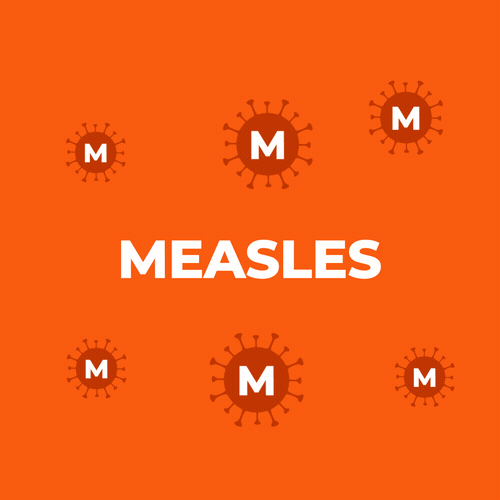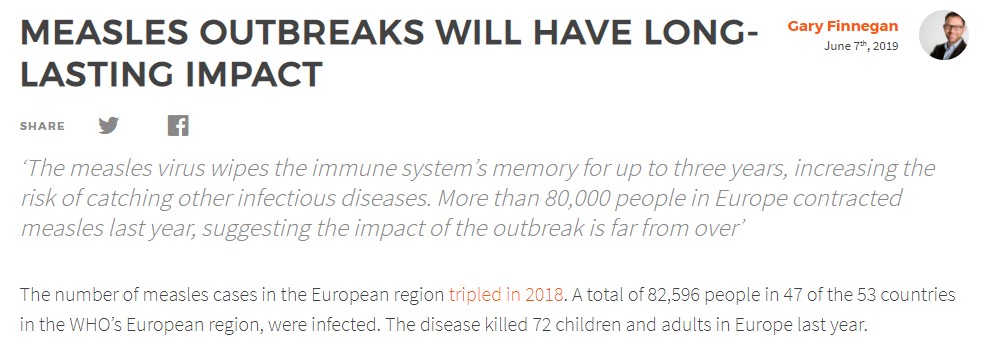Your grandparents worried about measles. Your grandchildren should not have to.
It’s decision time.
If you choose to vaccinate the next generation against measles, the virus can be eliminated – just as it was in 2016 in the Americas, north and south.

However, this is far from a sure thing. Complacency is the enemy of Europe’s elimination plan. The measles virus spreads so quickly: in the absence of immunity, each infected person will pass the virus to between 16 and 18 others. This means that, given half a chance, just a few cases can rapidly trigger an outbreak if community immunity levels are too low.

Vaccination: a victim of its own success
Measles is far less common than it was a generation ago. In most countries, today’s parents, and even some younger health professionals, have rarely or never seen a case.
But, while most people experience mild symptoms, up to one in four children infected by measles in developed countries can be hospitalised. In rare cases, measles can cause inflammation of the brain, potentially leading to death or permanent disability.
‘A vaccine against measles in 1959 would have meant a normal life for my brother Paul,’ says Dr Jane Barrett, Secretary General of the International Federation on Ageing. ‘Today immunisation is an intergenerational responsibility – we cannot and should not be complacent in the fight against measles.’

In the 10 years since the launch of Vaccines Today, one story has been viewed more than any other and continues to be shared widely. It was written in 2013 by Ruediger Schoenbohm, the father of Max, a boy who developed complications of measles.
Max had caught the virus at six months of age. He was too young for his first MMR vaccine. Despite appearing to recover from the initial infection, he would later develop SSPE, a complication of measles which is invariably fatal. In February 2014, we updated the piece to report the sad news that Max had passed away at the age of 19.
Last year, we followed up with Max’s brother Julian, a filmmaker who captured his family’s story in an arresting video built around family photos and home videos. The article and video are well worth your time, but some readers/viewers may find the content distressing.
Max’s story is, thankfully, very uncommon (although not unique). However, the full impact of measles outbreaks may be larger – and longer lasting – than previously thought. Scientists have discovered the infection with the measles virus ‘wipes’ the immune system’s memory for up to three years, increasing the risk of catching other infectious diseases.

This implies that measles outbreaks can have an impact long after the initial illness clears. Just as some people infected by COVID-19 report symptoms of long COVID, people can suffer a form of ‘long measles’.
An enemy lying in wait
The Vaccines Today archive is packed with pieces on Europe’s bid to eliminate measles and rubella by 2015. This one asks how countries can ‘finish the job’ of wiping out the virus on the European continent.

Of course, it wasn’t to be. By 2018, we were reporting the grim news that ‘measles is back’, with one in four countries reporting large outbreaks. Not only had the 2015 elimination goal not been met, but cases were up 400%.
The cause? Vaccination rates had declined over time, due in part to rising hesitancy following the publication of a new– withdrawn 1998 paper by former doctor Andrew Wakefield. With vaccination rates below the herd immunity threshold. We had left the door open to an opportunistic virus which began to spread between unprotected people.

Sadly but inevitably, death rates rose too. 49 children and adults died of measles in the EU in 2017, despite the availability of a safe and effective vaccine.

As COVID demonstrated, viruses know no borders. Outbreaks in one country quickly spread to others.

And, to Europe’s global embarrassment, uncontrolled measles circulation can trigger cases in countries where the disease has been suppressed.

The choice is ours
‘Thanks to vaccines, many of today’s citizens and health professionals haven’t seen measles,’ says Silva Romeo of Think Young and a leader of the Young Coalition for Prevention and Vaccination (YC4PV). ‘But we know that if we are complacent, it will return very quickly. Our generation must seize the historic opportunity to eliminate measles in Europe.’
COVID-19 has illustrated how viral diseases can spread easily and widely in families, schools and workplaces, from one country to another, and even across continents. We have, perhaps briefly, an unprecedented moment in which to embrace measles elimination.
The question is: how will this generation respond.




